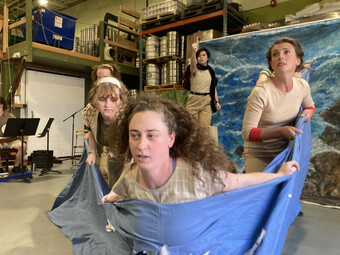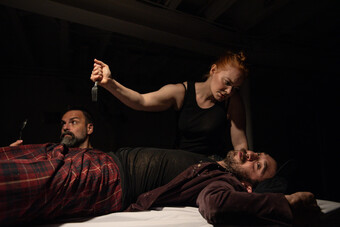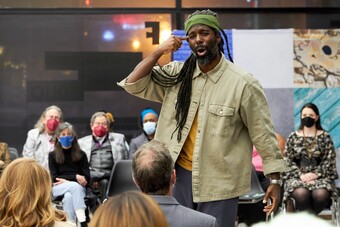The Antipode of Camaraderie
Shakespeare Through the Lens of a Military Veteran
This series examines Shakespeare from a military veteran's perspective and offers a new angle on Shakespeare's text and characters, while delving deep into the challenges facing American theater and society.
Creating the illusion of physical, emotional, cultural, moral, social and mechanical distance between people is a necessary component for war and killing. The illusion is created and maintained, in part, by using illustrative, emotion-invoking language that clearly defines "us" from "them."
Powerful speeches before war defining the differences of who we are fighting, and why we are justified in our killing are a tradition as current today as in Shakespeare's day. Consider Richmond's orations to his soldiers in Richard III, Act V, Scenes 3 and 5, and how they bear a striking resemblance to presidential speeches delivered over the last thirteen years. Both Shakespeare's Richmond and our presidents use language to dehumanize the adversary while reinforcing camaraderie among those who are listening. Note how both leaders are using and repeating specific words or phrases to amplify bias and reinforce camaraderie:
RICHMOND
...Loving countrymen (Oration to his troops before battle with Richard's Army)
PRESIDENT GEORGE W. BUSH
...fellow Americans ("War on Terror" speech, September 20, 2001)
RICHMOND
For what is he they follow? truly, gentlemen,
A bloody tyrant and a homicide;
One rais'd in blood, and one in blood establish'd
PRESIDENT BUSH
The enemy of America [...] is a radical network of terrorists [...] Al Qaeda is to terror what the Mafia is to crime [and] are linked to many other organizations in different countries, including the Egyptian Islamic Jihad, the Islamic Movement of Uzbekistan.
RICHMOND
One that hath ever been God's enemy.
PRESIDENT BUSH
...we see Al Qaeda's vision for the world [...] to kill Christians and Jews...
RICHMOND
If you do sweat to put a tyrant down,
You sleep in peace, the tyrant being slain;
If you do fight against your country's foes,
Your country's fat shall pay your pains the hire;
PRESIDENT BUSH
It will not end until every terrorist group of global reach has been found, stopped and defeated. [To our military], you have the gratitude and respect of the American people and you can know that our forces will be coming home as soon as their work is done.
RICHMOND
If you do fight in safeguard of your wives,
Your wives shall welcome home the conquerors;
If you do free your children from the sword,
Your children's children quit in it your age.
PRESIDENT BUSH
The terrorists' directive command them […] kill all Americans and make no distinctions among military and civilians, including women and children […] These terrorists kill not merely to end lives, but to disrupt and end a way of life.
RICHMOND
Then, in the name of God and all these rights,
Advance your standards, draw your willing swords!
PRESIDENT BUSH
...assured of the rightness of our cause and confident of the victories to come [...] In all that lies before us, may God grant us wisdom and may he watch over the United States of America.
RICHMOND
For me, the ransom of my bold attempt
Shall be this cold corpse on the earth's cold face;
PRESIDENT BUSH
I will not forget the wound to our country and those who inflicted it. I will not yield, I will not rest, I will not relent in waging this struggle for freedom and security for the American people.
***
According to Major Richard A. Gabriel’s Combat Cohesion in Soviet and American Military Units, a crucial component in camaraderie is that "all participants are united by similar hardship, risk, and fear, and by the understanding that their leaders will endure similar conditions.”
RICHMOND
God, and Saint George! Richmond and victory!
PRESIDENT BUSH
May God bless our country and all who defend her.
(March 19, 2003)
This last speech is President Bush's announcement of the beginning of U.S. military operations in Iraq, which results in the destruction and defeat of the Iraqi army, as well as Saddam Hussein's removal from power, capture, and execution.
Meanwhile, back in medieval England’s Richard III, Richmond and his army attack Richard III's Army, which results in the destruction and defeat of Richard's Army, as well as Richard's removal from power, capture and execution. In Act V, Scene 5, the now "victorious" Richmond, new owner of England's crown, stands before Richard III's dead, mutilated body, and addresses his nation:
RICHMOND
God, and your arms, be prais'd, victorious friends:
The day is ours; the bloody dog is dead.
Even in death, Richmond continues to dehumanize Richard III by calling him "the bloody dog." In what perhaps may be a contrast, President Obama called a person many Americans considered a bloody dog by name:
PRESIDENT OBAMA
Tonight, I can report to the American people and to the world that the United States has conducted an operation that killed Osama bin Laden, the leader of al Qaeda, and a terrorist who's responsible for the murder of thousands of innocent men, women, and children. (Death of bin Laden speech, May 1, 2011)
The announcement of his death led to Americans spilling out into the streets, waving American flags and chanting "U-S-A."
***
In the closing remarks of a speech by President George W. Bush on May 1, 2003 aboard the USS Abraham Lincoln, beneath both the American flag and a giant "Mission Accomplished" banner, he stated:
PRESIDENT BUSH
In words of the prophet Isaiah, “To the captives, come out; and to those in darkness, be free” […] Thank you for serving our country and our cause.
President Obama, closed his May 1, 2011 speech with words from our nation's Pledge of Allegiance:
PRESIDENT OBAMA
Let us remember [...] who we are: "one nation, under God, indivisible, with liberty and justice for all."
The establishment of the antipodes "us" versus "them" serves two primary purposes: one, to dehumanize and therefore establish distance from those we are about to kill; and two, to clear the conscience from murder, or any wrong doing, after the killing. I draw the parallels between Richmond's speech and speeches delivered by two of our presidents to show that theater elucidates both the repetition of history, and how we must distance ourselves from humanity in order to go to war. Theater also holds the power to reconnect us after war, just as it did for the ancient Athenians, and just as it may have done in Shakespeare's day—but more on that next time.











Comments
The article is just the start of the conversation—we want to know what you think about this subject, too! HowlRound is a space for knowledge-sharing, and we welcome spirited, thoughtful, and on-topic dialogue. Find our full comments policy here
Dear Stephan Wolfert,
Thank you so much for writing this series of essays. I regret, and sincerely apologize, for not having read any of them before tonight... but I'm so grateful that something caused me to read one tonight -- which lead to me to going back to the first one and then reading all nine!
I wish there was some way for me to get every single person in the country to also read them. Then, perhaps, people would better understand the tremendous human cost of the United States government insisting on having a huge military that is constantly involved in seemingly every possible conflict overseas (and, arguably, causing even more).
Especially in this day and age when, alas, so many democrats (once the peace party) have been convinced by the likes of Obama, H. Clinton, and Sen. Barbara Boxer that these endless wars are necessary. (And of course most republicans in congress or the white house have long been warmongers.)
It is especially disconcerting to see women being convinced by H. Clinton that war after war (Libya, Syria, Iraq) are necessary, given what you said in one of your essays:
"What is honor when one of every three women in the service is raped, but eighty percent of the perpetrators and those accused of rape are discharged with honor?"
How different things might be if every woman and man, young and old, republican or democrat, read your essays.
As Shakespeare might say, "Would that it were."
Now more than ever we need to be reminded all is one. Thank you for making me think of who I consider as us and who I think is them.